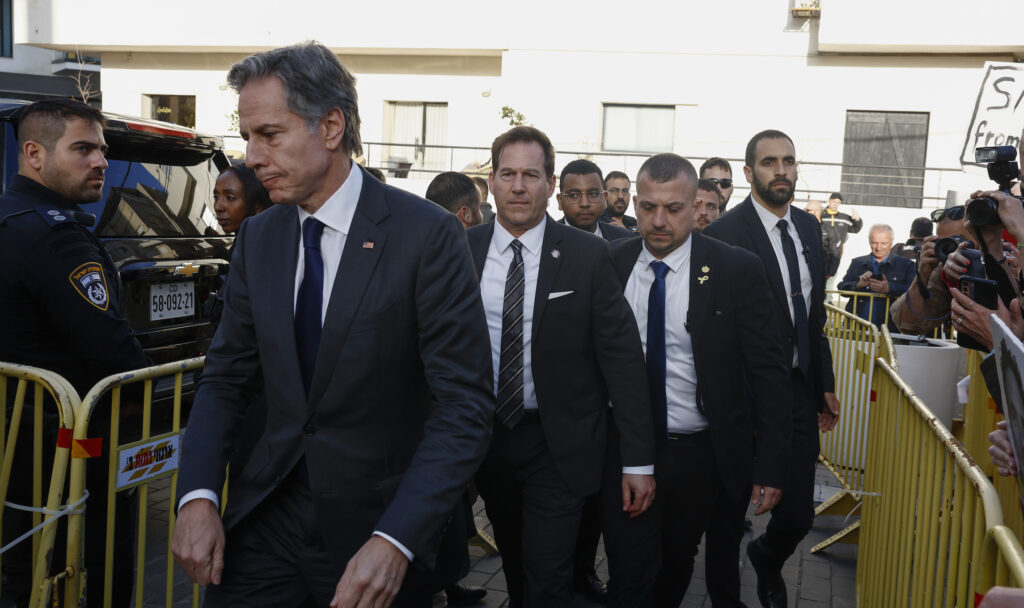
The Biden administration is desperately trying to convince Israel not to carry out a full-scale military operation in Rafah, the southern city in Gaza where more than 1 million Palestinians are sheltering from the front lines.
President Joe Biden spoke by phone with Israeli Prime Minister Benjamin Netanyahu on Monday, which was their first conversation in more than a month, and he agreed to send an interagency delegation to Washington, D.C., to meet with U.S. leaders to discuss “an alternative approach that would target key Hamas elements in Rafah and secure the Egypt-Gaza border without a major ground invasion,” Biden’s national security adviser Jake Sullivan said on Monday.
Additionally, U.S. Secretary of State Antony Blinken traveled to Israel on Friday to meet with leaders and Israeli Minister of Defense Yoav Gallant is coming to Washington, D.C., next week to meet with U.S. Defense Secretary Lloyd Austin.
BIDEN DEMOCRATS BREAK WITH ISRAEL
“President Biden has been very clear that a major ground operation in Rafah would be a mistake and something that we can’t support,” Blinken said on Thursday while in Egypt. “There is no place for the many civilians who are massed in Gaza — in Rafah, excuse me — to go to get out of harm’s way. And for those that would inevitably remain, it would be a humanitarian disaster.”
The debate, which Blinken described as “a false choice,” as outlined by top Israeli and U.S. officials, is whether Israel can achieve its military objectives without carrying out full-scale operations in Rafah. Israeli leaders have said it’s the only way, but the U.S. disagrees.

“There is also a false choice involved here, because we are determined — as Israel is, and indeed as other partners in the region are — to deal with the ongoing problem posed by Hamas, a threat to so many,” he explained. “And Hamas can be effectively dealt with without a major ground operation in Rafah, and one of the reasons that we have counterparts from the Israeli government coming to Washington next week is precisely to focus on that, to share with them our views on what alternative actions could be that would deal with this very significant problem, but in a way that does not do further harm to civilians.”
Netanyahu, following his meeting with Blinken on Friday, said in a video that the Israelis “recognize the need to evacuate the civilian population” but did not specify how they planned to do that or what they would do to support those people.
“But I also told him that we don’t have a way to defeat Hamas without going into Rafah and eliminating the remaining battalions there. And I told him that I hope that we will do it with America’s support, but if we need, we will do it alone,” Netanyahu explained.
Austin and Gallant spoke over the phone on Wednesday and the U.S. secretary of defense “raised the need to consider alternatives to a major ground operation in Rafah, while reiterating the shared goal of defeating Hamas,” according to Pentagon spokesman Pat Ryder.
Israel’s military began in the northern part of Gaza and has subsequently moved south as they cleared specific areas of the north. They have effectively gone from north to south throughout the strip fighting against Hamas battalions, and Rafah is the last remaining city center they have to clear to complete the clearing operation.
But, there are now more than 1 million people who have fled to Rafah to avoid the war and Israeli forces have not allowed Palestinians to move back north, and even if they do, about 35% of all buildings in Gaza have been damaged in the war.
Biden has repeatedly shared his belief that Israel has the right to go after Hamas, though he and his administration have urged the Israelis for months to do more to prevent civilian casualties. The Gaza health ministry, which is controlled by Hamas, has said roughly 31,000 Palestinians have been killed in the war. That number does not distinguish between civilians and combatants.
Another major aspect of Blinken’s trip to the Middle East is the U.S.’s pursuit of a temporary ceasefire agreement between Israel and Hamas that would stop the fighting for roughly six weeks, which would allow for a surge of humanitarian aid to get into the strip, in exchange for about 40 of the roughly 100 hostages that Hamas has held since Oct. 7. Hamas took roughly 250 hostages during the attack, more than 100 of whom were returned during a weeklong ceasefire deal in late November.
CLICK HERE TO READ MORE FROM THE WASHINGTON EXAMINER
The U.S., Qatar, and Egyptian governments have spent months trying to get Hamas and Israel to agree to such a deal, but an agreement has eluded negotiators.
“The teams are working every single day on this,” Blinken said on Thursday. “As I said, there are still real challenges. We’ve closed the gaps, but there are still gaps. So I can’t — I can’t put a timeline on it. I can just say that we’re committed to doing everything possible to reach an agreement, and that work is ongoing as we speak.”
It’s unclear how many of the remaining hostages are still alive, and five Americans are believed to be among them.







